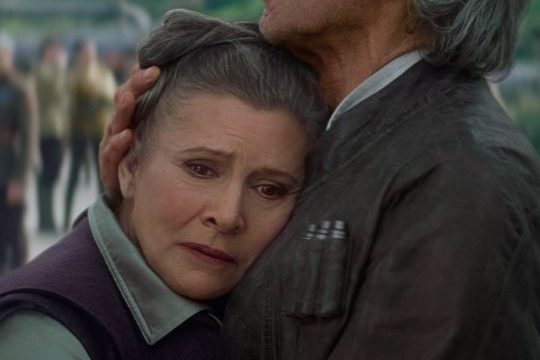I was going to celebrate her living this week. I’d celebrated her mother. She was only sixty; I was convinced she could hold on long enough to qualify. As was her mother. As were we all. It almost feels as though her loss was the worst 2016 could throw at us, because it so summed up how the year has gone—the feeling that it couldn’t possibly be that bad, and that this one thing would not go the way we feared. And then it did. I’ve seen all the claims. “It’s perception bias!” “You’re yourself acting the same way and wondering what the problem is!” And in the end, we will wake up tomorrow in a world without Carrie Fisher in it.
Actually, I’d set myself the goal to write about her for Sunday without doing any research whatsoever, because I was certain that I knew enough about her to do it. She wasn’t just Leia Organa [Solo]. She had done a few roles before that, many roles after—between, now—and much else besides. She was one of Hollywood’s great script doctors, generally a thankless and unacknowledged role. Never an Oscar winner—I do not even believe a nominee—herself, she wrote a book that became a movie starring the woman who basically personifies the modern Oscars. She was an openly bipolar woman who struggled with addiction and became an advocate for others so suffering.
This is one of the articles I’m writing through tears, though, because she was so important to me. It’s not even that I’m that huge a Star Wars fan, by the standards of Star Wars fans. I’m not sure I’ve ever written about the series for this site. What I’m going to miss is her ferocity as a person, her determination not to slip into the dark night that her illness encouraged in her. The fact that, probably because of her illness, she had reached the stage of simply not caring what people thought. She began to say what was on her mind, and it came from a place of incredible anger and incredible compassion. She had faced her demons and surpassed them. She was what a mentally ill person could be.
And, yes, the first thing I knew her from was Star Wars. I was a child; I am scant months older than the franchise, as I was born in December 1976 and it was released in May 1977. Much of my childhood involves a fascination with the series; I remember clearly going to a friend’s Star Wars-themed birthday party around the time Return of the Jedi came out. I held onto resentment at my mother for years, because she went to see it without us. (I forgave her a few years ago when I realized what the movie was about and thought about taking children who had just lost their father to see it.) My whole life, Carrie Fisher has been part of it.
But this is the first paragraph where I’m contemplating research, for the list of movies she’s an uncredited script doctor on. I’m certain that list is immense. Indeed, I know it is, and I just can’t remember details, either because it just didn’t stick in my brain or because I’m grieving. Even if it were all she’d ever done in Hollywood, it would be reason enough to learn her name. In ways most people will never know, she shaped what we saw on the big screen. If she’d never acted, if she’d never written her novels, she’d still be someone worth mentioning in those year-end lists because of that work.
And, of course, there are her not-Star Wars roles. Less memorable, to be sure. She’s still a delight as Sally’s married man-obsessed friend in When Harry Met Sally or the hypersexual casting director in Soapdish, two of my favourite comedies. She never had Harrison Ford levels of work, but she always worked if she wanted to.
I’ve never read her books, but I’m sure she’ll be known for them, too, and of course for the movie of Postcards From the Edge. (Which I haven’t seen.) By extension, too, I’m sure the books are full of her trademark acerbic wit. She was on QI, a British game/panel/celebrity chat show originally hosted by Stephen Fry and currently by Sandy Toksvig, and she was a joy on that. She knew she was always going to be seen as who she was; I’ve read that she’d sometimes get tables in restaurants by putting dinner rolls over her ears to prove her identity.
And, yes, she was Princess Leia. General Leia, now. A tough woman who was unafraid to speak her mind, even to Darth Vader. Sure, she needed rescuing from the Death Star; that’s not a thing it’s really possible to escape from yourself. But from that point on, she was more experienced than Luke, more competent than Han, more articulate than Chewie. One wonders, indeed, if she and R2 said snarky things about the others to each other when the cameras weren’t recording their story. And, when the man she loved was in trouble, it was her turn to rescue him.
I cannot imagine the grief Debbie Reynolds must be feeling today, having lost her daughter. But I feel certain she knows that millions of people worldwide share her grief and did not want this to happen. I don’t know if that makes it better or worse.

